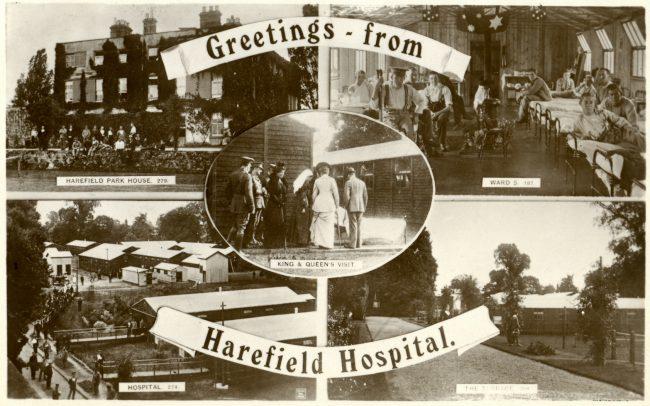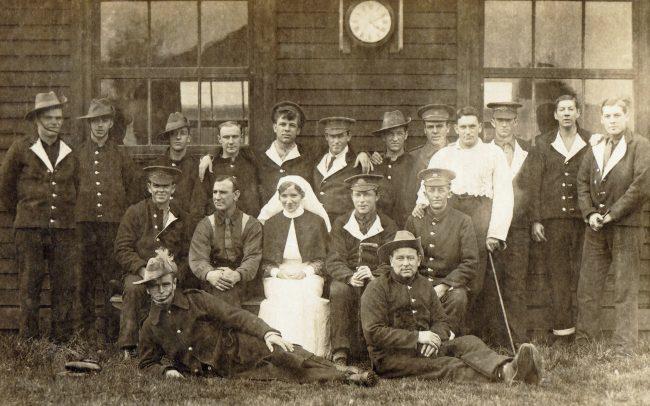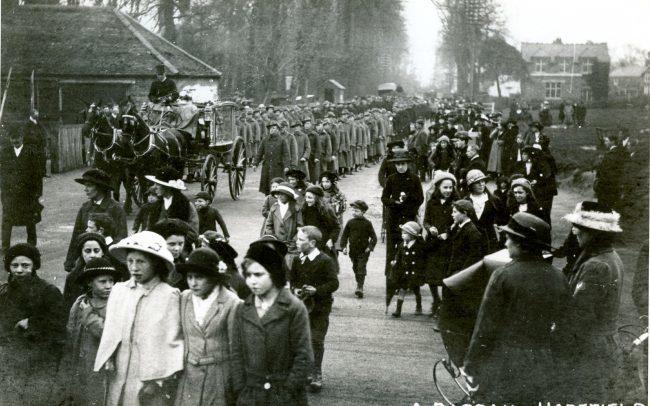Excerpts From The Book:
HAREFIELD & THE WAR
“In 1915 No. 1 A.A.H. was opened, and the first batch of wounded men came in. With one common accord, the humble village folk opened their hearts and homes to our boys – from then until last year, when the hospital closed, one could never pass by the old-world cottages without seeing through the ever-open doors big forms in hospital blue, for every “digger” had his little corner, and the brave English mother whose son was “missing” at Mons became the first to welcome the soldier from “down under.”
The wealthy people around could not have done more for the boys. Harefield Park itself (where the hospital was located) is the property of Mr. Billyard-Leake, a local resident and an Australian himself. But for the villagers, times were often hard. In the distance the enemy bombs could be heard dropping over London. Food went up – essentials were strictly rationed. But there always seemed sufficient for the boys who dropped in to tea. People from other parts of the old country helped to make Harefield happy for the boys. The farms round about employed Land Army girls, and part of the time practically the whole of the hospital milk supply was in the hands of these workers, who saw to the milking of the cows and the delivery of the milk.
The cheerful land lassies, in their mud-be-spattered gaiters and corduroy breeches, were one of the most popular features with the “Diggers.” English V.A.D.s helped the Australian sisters in the hospital itself, and a squad of khaki-clad motor girls drove the ambulances with their burdens of human suffering from the station three miles off.”
Sydney Morning Herald. February 13, 1920.
AUSTRALIANS ABROAD
“They told me you were dead” were the first words exchanged between two men of the 1st Battalion, as they shook hands. The convalescent grinned cheerfully. “They put a bullet through my lungs,” he said, “but I’m nearly all right, except a bit short-winded. I hope to get back in a few weeks now.”
“What happened to you when you fell?” asked someone. “Was there anyone to pick you up?” The boy shook his head. “I got a mate to take my pack off. We were near the top, a steep ridge, and there were snipers everywhere. I felt a bit faint, and guessed I would not manage the journey, so I lay down, and rolled to the bottom of the hill. Snipers thought I was dead, and didn’t bother about me, I expect. I don’t remember much after that.”
The Australasian. Melbourne, Victoria. August 21, 1915.
ANZACS IN ENGLAND.
LOVED AND ADMIRED BY CHILDREN.
SOME QUAINT LETTERS.
Soon after a hospital was established at Harefield, England, Miss S. McLaren, of Victoria, who is interested in the “Cheer up Brigade,” wrote to the head master of Council school, Harefield, a letter to be read to the scholars. She told them of the work of the Cheer Up Brigade, and expressed thanks for the treatment by the Harefield folk of the Australians. The letter was read at school, and was greatly appreciated by the boys and girls.
The affection and pride they have for the Australians is shown in a number of letters written by them to Miss McLaren. The subject matter of the letters is much the same, but the various incidents recorded are told in quaintly childish fashion. One girl relates that an Australian soldier came into the school, and, picking up the cane, commenced to teach them. When he was asked how to do a certain sum, however, he was “done,” and had to admit that he had never seen a sum like it in his life. Snowballing with the Australians is described as “great fun,” and one letter states: “We like it very much when the soldier runs after us. A few days ago there was a big snow fall, and we gave the soldiers ‘what for.’” Gratitude is expressed for the “grand party” arranged by the Australians at Christmas time for the scholars, when they regaled the children with fruit and lollies, and a “present.”
A little miss of ten summers is vastly impressed with the physique of the Australians. She says: “The Australians are very strong. One was in my aunty’s house, and he told me to feel his arms. My word, they were so hard!” Most of the letters state that “Australia Will Be There” is sung at every opportunity. At the Christmas party, after cheers had been given for the King and Queen, the Harefield “whisper” was given for the Australians. It is explained by the head master that the “whisper” is the noisiest thing imaginable from children.”
Daily Telegraph. Launceston, Tasmania. April 26, 1916.
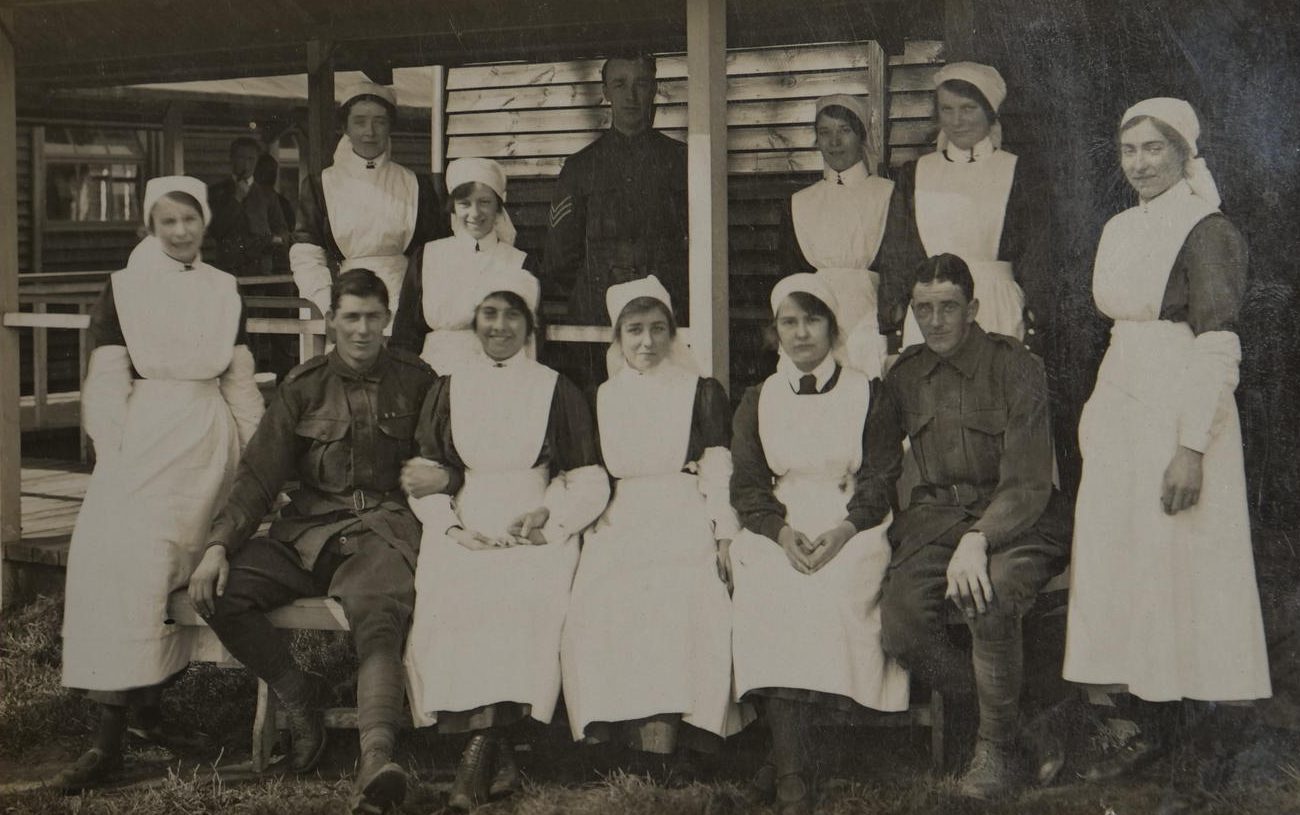
THE LATE PRIVATE KELLY.
FUNERAL IN ENGLAND.
“Two long lines of blue figures moved with a slow tread behind the hearse, showing that free-swinging movement peculiar to the Australian troops. But some were on crutches, and some moved with a cruel limp, yet marching bravely, nevertheless – a relic of the first splendid fighting force who had gone from Australia and landed a year ago on that rocky peninsula.
Behind the row of wounded came the staff of the hospital in khaki, and bringing up the rear hurried the village of Harefield – shaky perambulators being whisked along, cyclists, old women bobbing as they went, mill girls in gay hats, and last of all some lumbering farm carts.
To which, if either stopped to think, must this spectacle have seemed the more strange – to the villagers, or those tall heroes of Australia, seemingly at home in their typical English village? Or to these men, this funeral in English surroundings amidst English village people? But the war has brought stranger things to pass than this spectacle. Nothing seems impossible now, and even an Australian soldier’s death in a quiet English village is accepted as natural.
Tungamah and Lake Rowan Express and St. James Gazette. Victoria. July 20, 1916.

A GOOD TIME IN LONDON.
Corporal W. J. Dryball, of Yass, writes to his father from the Australian Convalescent Hospital Harefield, England, under date June 3:- “Just a line to let you know that I am getting well.
My hand has improved a great deal. I think I will lose a finger or two, but that is much better than losing a hand. We are now with some of our own nurses and doctors. We feel very much more content, because they understand us better than the English nurses do. We are only 17 miles from London. The country is beautiful.”
Evening News. Sydney, NSW. August 3, 1915.
SOLDIER’S LETTER.
PRIVATE C. RICHARDSON.
“Now, they cracked me pretty soon; they got me on the second day. You know I tried to keep up my rep. and get as far as possible to the front, Old Jock (Jim Clark) and I. I tell you, Tom, I never saw any of the boys in front of Jock, only Turks, and you could shut your eyes and get them. Jock is as game as they make them and was by my side when they got me, and it hurt some to part. I’ll never forget the look on his face when he said, ‘Good-bye, Rich.’ I could not see my own face, but know too well what I felt.
No man left the front with a sadder heart than I, but I had to go; my arm was badly broken, but I have still got it and it will be useful to me; it is only half an arm in strength.…The doctors here tell me that I will not be sent back to the front again, but I may cheat them yet. Wait until the good old summer comes, then I’ll shine again with the sun. It is too cold for me and many of our men here.”
Mount Magnet Miner and Lennonville Leader. WA. February 26, 1916.
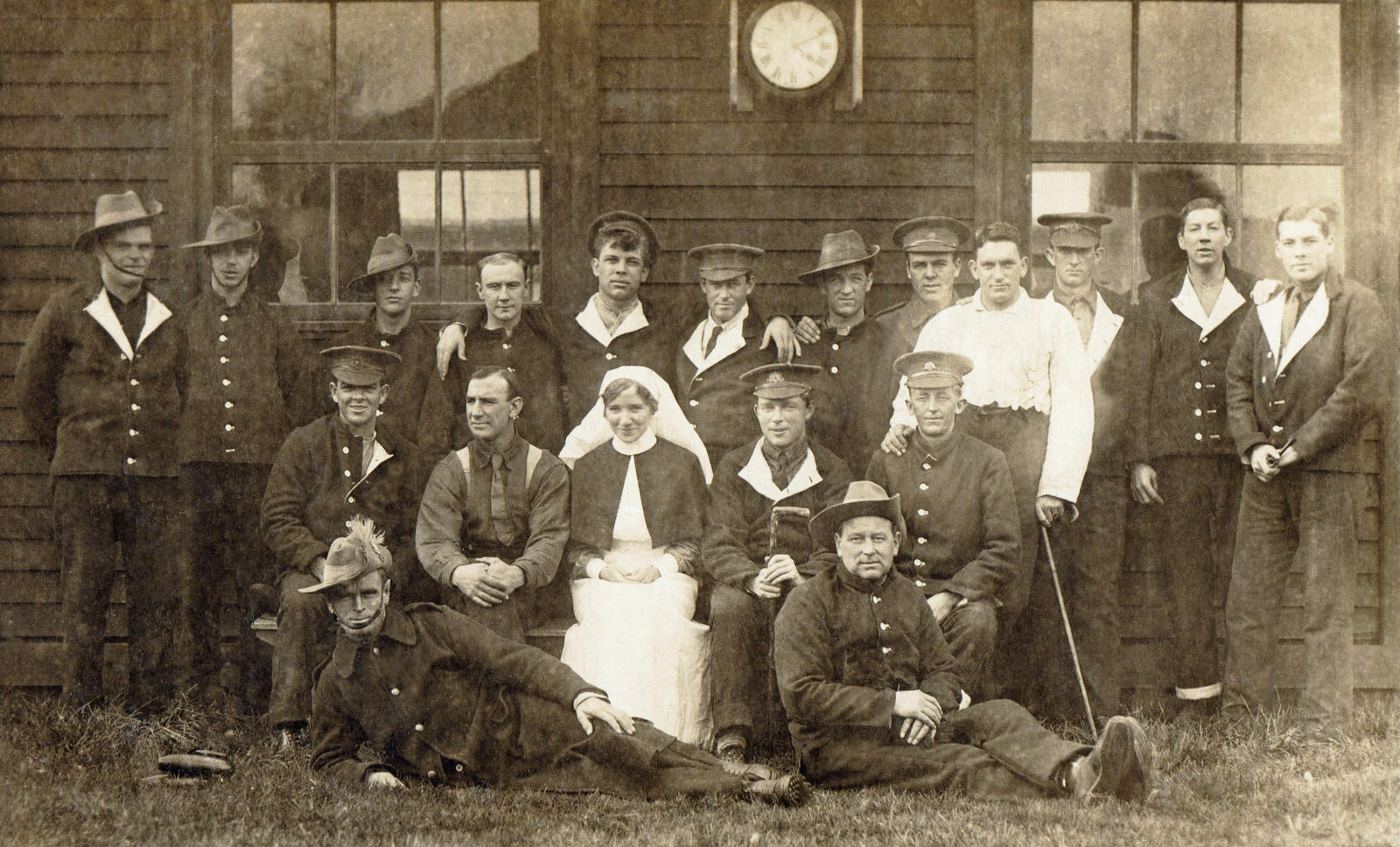
“For Mother”
Mr. E. M. Bryden, of Murraytown, writes: In a letter I received from Matron Gray of the 1st Australian Auxiliary Hospital, Harefield Park, England, the writer says:- “I often wish the mothers in Australia could know how constantly they are in the minds of their boys.
Frequently they come to my window and show me different things that they have gathered, and always ‘It is for my mother.’ Perhaps if the mothers knew the knowledge would be some small compensation for what they are going through while their boys are away.”
The Register. Adelaide, South Australia. March 17, 1916.
LETTER FROM HAREFIELD PARK.
“Re the fighting. It is hard to explain: but I can conscientiously say that I saw more shells in 10 minutes at Gallipoli than in two years in South Africa, and what fine shooting it all was.
The Turks were perfect artillery-men, and their snipers – well, they would win Bisleys without trouble. Trench fighting is slow compared with mounted work, but when a charge from the enemy occurs it’s fast enough for any man. The first affair I took part in was a demonstration to draw the Turks’ fire, while our lads delivered an attack on the left flank (Quinn’s Post).
Dante’s Inferno was not in it. Machine-gun fire rattled up and down the parapets: shells and bombs screeched over us. Two lads, Raven and Williams, were knocked over, the former seriously wounded, the latter slightly. The excitement was great, all anxiously waiting for an order to charge. Unfortunately it never came. During attacks at different points at night we would be treated to fireworks display by the Turks, and to describe the effects would occupy pages – a sight an artist dies for. Many stories reached us re the barbarity of the Turks: but I am afraid greatly exaggerated. What little I saw, they appeared to be real clean fighters, and from accounts published by the American Consuls the prisoners are being well cared for.
Still, I wish the whole thing would end. Lives are being sacrificed daily and nothing being gained. No doubt a big move is near at hand, and that will settle the Gallipoli question.”
Kyneton Guardian. Victoria. Saturday December 4, 1915.
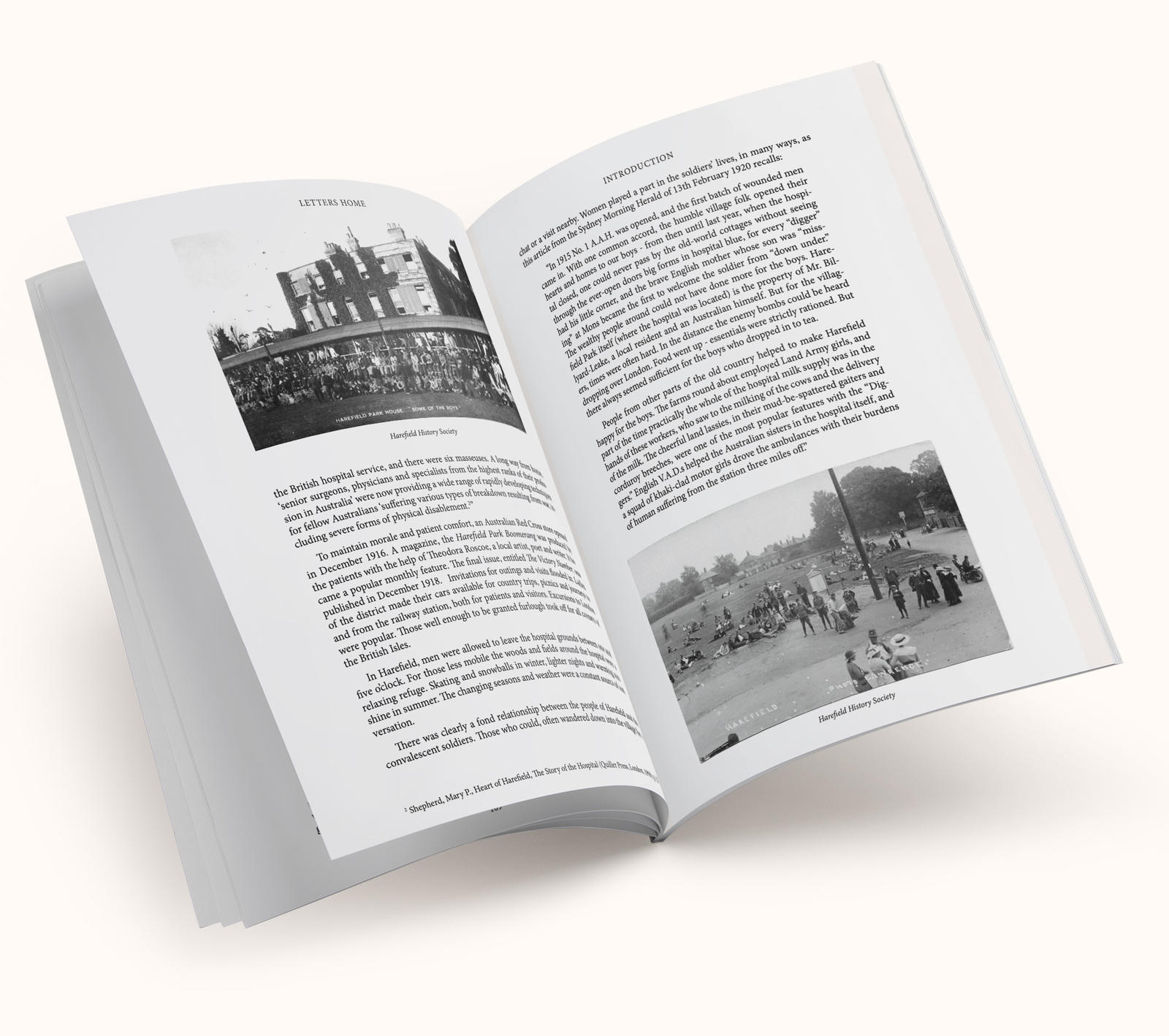
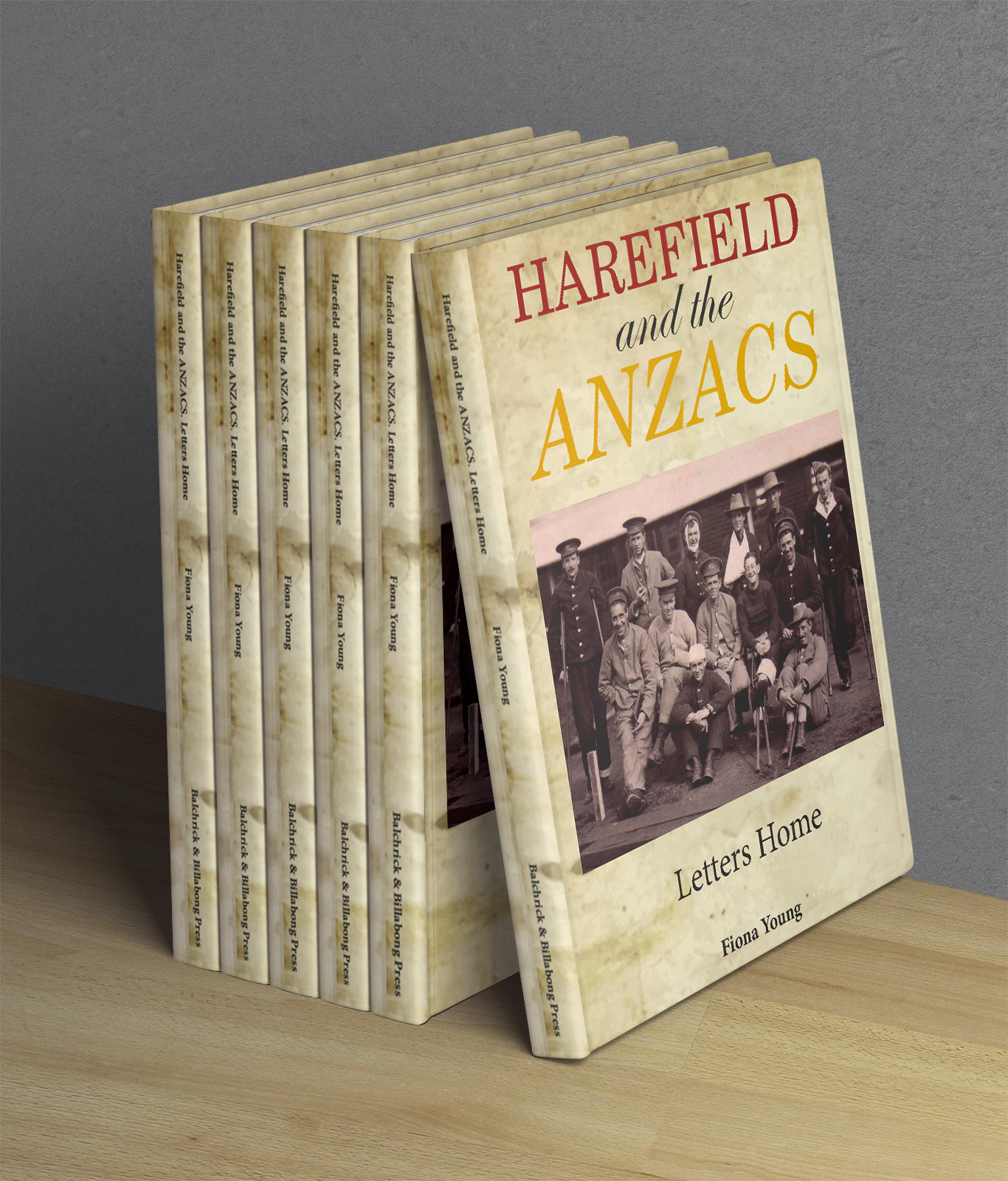
Fiona Young is an independent writer and researcher with interests in local, social and women’s history.
If you would like to get in touch – harefieldanzacs@gmail.com.

